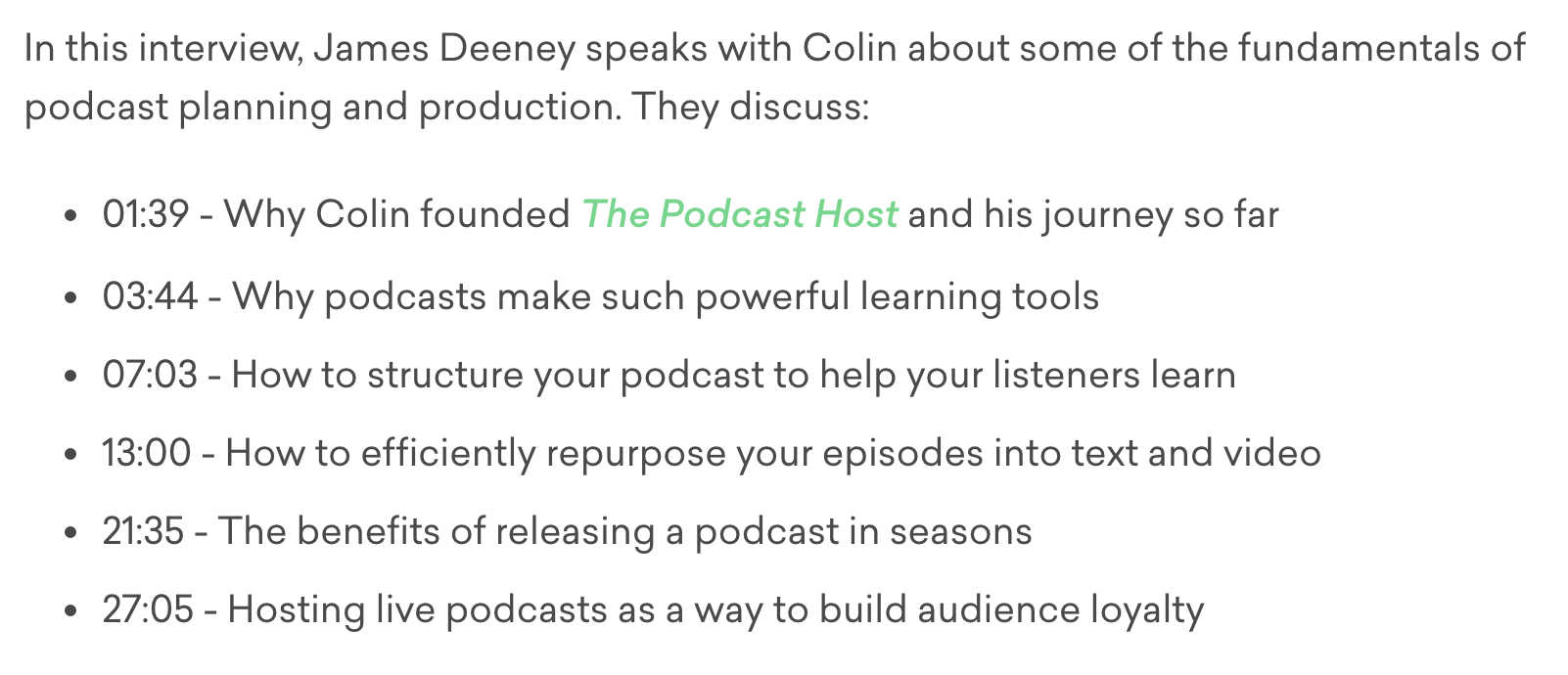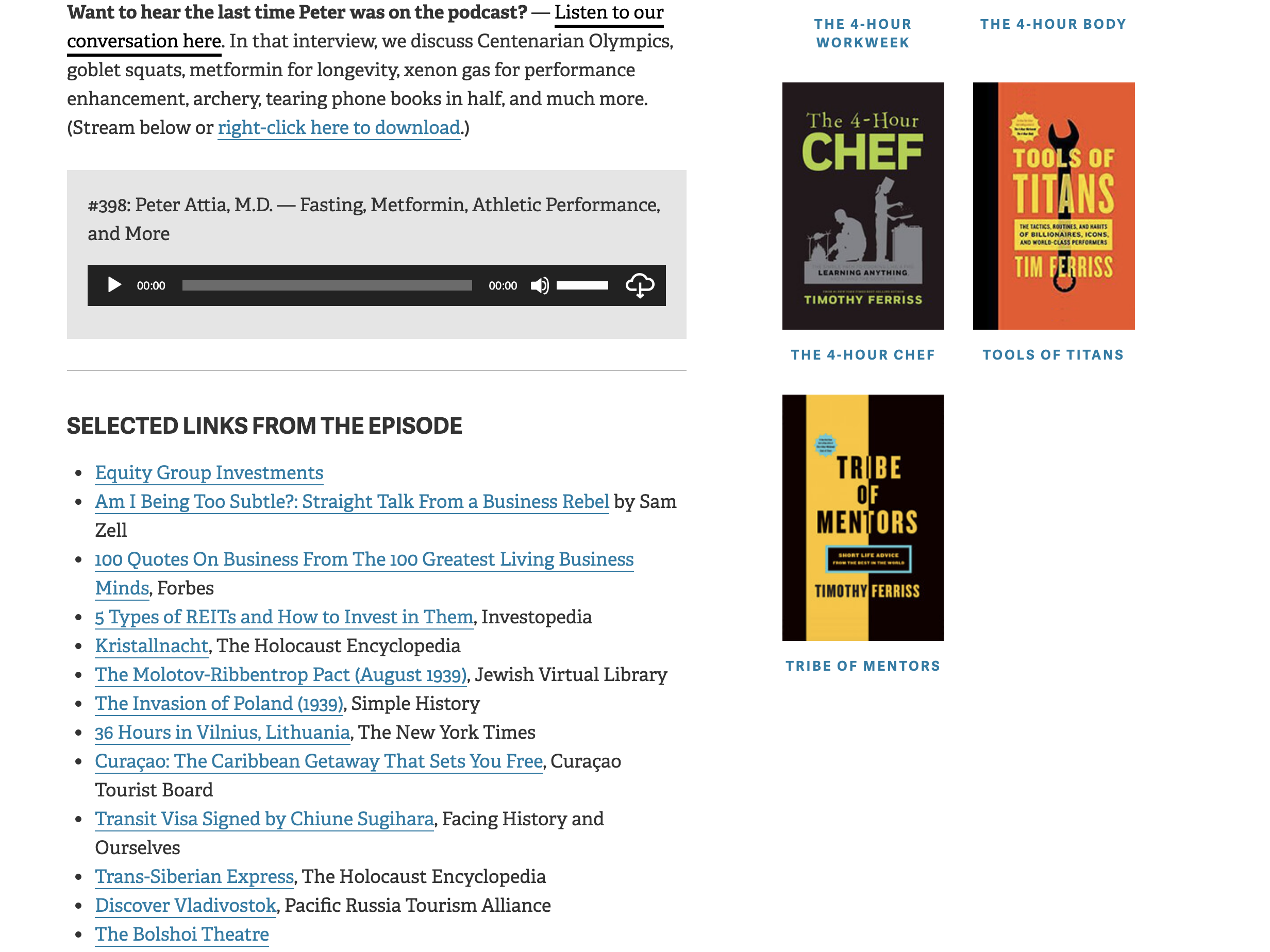Would you put on your shoes without tying your laces? Well, that’s essentially what you’re doing if you publish your podcast without show notes. You’re leaving the job incomplete.
Podcast show notes are important. Especially if you’re hoping to drive traffic to your website off the back of your podcast. They bring new visitors to your site through two main funnels: organic SEO and direct traffic from your podcast.
In this post we’ll look at how and why those funnels work, and walk you through a simple process for creating effective show notes.
What are Podcast Show Notes?
You’ve probably heard about show notes before. But if you haven’t created any, you might be unsure how they should look.
On the most basic level, podcast show notes provide a written overview of each of your episodes. They are similar to the episode description you input on your hosting platform, but more detailed.
Tip: As a general rule of thumb, the more detailed your show notes, the more effective they’ll be at pulling traffic to your website.
They typically offer things like more information about the episode, a time-stamped breakdown of topics covered, some background on your guest(s), and a list of useful links to any resources you mentioned in the episode. Basically, stuff that’s of benefit to your listeners. Show notes come in lots of different layouts and styles, but they usually look something like this:

Show notes act as an information hub where interested listeners can go to engage with your show on a deeper level. And they also make sure your episodes can be found on Google.
What Are the Benefits of Writing Podcast Show Notes?
As touched on above, podcast show notes are useful for many reasons. We’ve gone into detail below.
They Help With Podcast SEO
Search algorithms can’t “hear” your episodes, so they need to be able to “read” them instead.
In order for your podcast to rank on Google (or any other search engine) you need to create at least some associated text to go along with your episodes. This will allow the algorithm to crawl your episodes and index them in the results pages. No show notes = no organic traffic to your podcast episodes.
But you’ll need more than a title and a few slap-dash sentences to get on page one. For optimal performance, your show notes need to contain at least 300 words and be optimised for a single target SEO keyword. Don’t worry, we’ll walk you through the process below.
They’ll Drive Direct Traffic to Your Website

You know all those stats about how engaged podcast listeners are? Well, they’re true. And if people are tuning in to your show regularly, some of them will want to go beyond simply listening. They’ll want to dig deeper into the topics you discussed. So be sure to remind them about your show notes during episodes.
Genuinely helpful show notes can act like a magnet, drawing listeners to your site. Make it easy for them to continue engaging with your content - use clickable links to signpost listeners to relevant resources, encourage them to post their own thoughts in the comments section, or entice them to check out other areas of your website.
If listeners know there is usually lots of helpful stuff to be found in your show notes, it’ll keep them coming back again and again. And over time, this significantly increases the chances listeners will purchase your product or service.
Listeners Can Learn More About Your Episode Topics
Show notes are the perfect place to tell your listeners a bit more about each episode. We’ll get into the specifics of what your notes should include later, but generally, their purpose is to inform the listener on what they can expect from tuning in. Whether it’s a bit more insight into the topic or the guest, providing more information is key to satisfying those invested listeners who want to dig a bit deeper.
You Can Use Them to Cross-Promote Older Episodes
If you’re constantly putting out new episodes, it’s easy for older ones to become buried in your backlog. And if there’s a particular episode that you’re really proud of, it’d be a shame for it to never see the light of day again. Using show notes to cross-promote previous episodes of your own podcast can help stop this from happening. For example, if a newer episode relates to an older one and you think your audience might be interested in it, listing it in your show notes is helpful.
They Make Episodes More Shareable
Podcast show notes are not only good for encouraging engagement, but they’re also easy for listeners to share amongst their peers. If they’ve already made their way to your website, and the content is useful, they’ll be more inclined to share it with someone else. If you don’t incorporate show notes into your overall podcast marketing strategy, it’s a lot harder for the listener to do so. Everyone uses different podcast listening apps, so sharing a single URL accessible to everyone is much more practical.
They’ll Encourage More People to Subscribe
Whilst getting people to your website is the main goal of creating show notes, they can also encourage people to subscribe to your podcast if they haven't already. It’s a win-win. If they like what they see, they might be tempted to tap the subscribe button on the page whilst they’re there.
The 6-Step Guide to Creating Great Podcast Show Notes
If you’re working hard to create great episodes for your audience, then it’s well worth investing a bit of extra time in show notes to maximise the ROI of your podcast. Because ultimately, more relevant site traffic translates to more sales.
Note: Check out this article on how to accurately measure the ROI of your podcast
But of course, you haven’t got endless time. You need a process that will allow you to be as efficient as possible. So here’s what to do.
1. Match Your Episode to a Specific Search Intent
What was the main theme of the conversation you had? What’s the central message of the episode?

For example, if your guest happened to be a marketing expert, then the central theme might be effective strategies to increase your Twitter followers. If your episode covers lots of different topics, choose the one you feel is most important.
Use the focus of the episode to select an appropriate SEO keyword to rank for. In the example above, the most appropriate keyword would be something like “how to get more Twitter followers”. You then need to optimise your show notes around that particular keyword.
Tip: You can use free SEO tools like Moz to review the monthly search volume for any given keyword.
Keep the focus narrow. It’s very unlikely you’ll be able to create show notes that will rank for several unrelated keywords. So select your keyword and stick to it. Put it in the episode title, URL slug, and scattered throughout the notes. For more on the fundamentals of SEO, check out this article.
2. Write A Google-Friendly Intro
Write up a short introduction for the episode (150 - 200 words). Introduce your guest and focus on communicating the central theme of the episode. Make sure your keyword is found in the intro at least once. But don’t go overboard. It will read terribly and even worse, Google may penalise you for keyword stuffing.
3. Embed Your Episode
Embed the episode so it features prominently on the page. If you’re using Podcast.co to host your show, you can do this by simply copying and pasting a short bit of HTML code, just like we’ve done below. Again, you can also use Podcast.co to embed a handy multi-platform subscribe button underneath the player. This stops the page from being cluttered by lots of different subscribe links.
4. Provide a Timestamped List of Show Topics
Breaking your episode down into timestamped bullet points will help appeal to the different audience types that come across your show notes. If your episodes are quite long, having this list will allow them to quickly skim the page and pick out the information most relevant to them. (Not everyone has time to listen to entire episodes!).
Limit yourself to one descriptive, tightly-worded sentence per bullet point. Something as simple as saying: ‘In this episode we discuss’ followed by your list is fine, as demonstrated in the below example:

5. Give Further Background on Your Guest
If a guest was kind enough to come on your show, then you should return the favour by linking to their site and promoting who they are and what they do. Show your appreciation by including some additional background information in your show notes, you should be able to find more than enough with a quick search on Google, or LinkedIn. You should also point listeners towards their social media profiles.
6. Add in a List of Relevant Links
Of all the elements on your show notes page, this is the most important part for drawing direct traffic from your podcast. If listeners want to learn more about something interesting they heard in the episode, they should be able to find everything they need here.
Feel free to include anything you feel is relevant. You might want to list websites, books, news articles, movies, research, or other related podcast episodes. Helpful signposting like this allows you to develop stronger relationships with your listeners. It essentially highlights the fact that you are creating the show with the intention of helping them as much as you can.

These essentials provide a solid template for creating great show notes. But feel free to get creative. There may be other elements you want to add in as well, such as:
- A summary of the episode’s main talking points
- Any interesting quotes that came up during the episode
- A transcript of the episode
- Affiliate links or details of the sponsor you’re working with
- Call-to-actions
- Charts, visuals, or videos
6 Best Practices for Writing Show Notes
Before you start drafting out your show notes, there are a few best practices and stylistic elements to keep in mind. We’ve outlined them below:
1. Make Sure They’re Clear and Concise
The simpler, the better. When writing your show notes, get to the point quickly. Don't use more words than you need to. Large blocks of text can put people off, and if they're too difficult to digest, readers will probably just bounce and go somewhere else.
2. Use Headings and Subheadings
Another thing that can help make your content easier to digest, is using headings and subheadings throughout. By clearly labelling your paragraphs, you’re being transparent about your content from the get-go.
3. Keep Them SEO Friendly
Boosting your podcast’s SEO is one of the main reasons for writing show notes. With that in mind, you should aim for at least 300 words for optimal performance. You should also match your episode to a specific keyword that you’d like it to rank for on Google. Once you’ve decided what that keyword is, try to work it into the body of your show notes a couple of times. For more on this check out our guide below:
How to Conduct Podcast Keyword Research
4. Stick To a Consistent Format
Because you should be writing show notes for every episode you release, keeping them consistent is good practice. So make sure that they all follow the same layout, structure, and design. Creating a strong brand identity helps listeners become familiar with who you are. The little details matter more than you think.
5. Write Them as You Go
This is mainly for efficiency. Making notes before, during, and after you record your episode is useful. For example, if your guest says something interesting during the recording, and you think it would sit well in your show notes, jot it down on the spot along with the timestamp. This’ll make it easier for you to go back to the exact moment and grab the sound bite later, without having to trawl through the whole episode. Basically, don't wait until everything else is done before you start thinking about show notes.
6. Make a Reusable Template
As mentioned above, keeping your show notes consistent is a good way of creating a familiarity and consistency around your podcast. So once you’ve written up your first set of show notes, and you’re happy with them, use it as a template for future ones. This means you won’t have to start from scratch every time.
Podcast Show Notes Services
If you don’t have the resource, time, or writing skills to be scribing show notes yourself, there are freelance services that will create them for you. You’ll usually have to pay for this, but it’s a great, time-saving alternative. We’ve listed a couple of them below:
- Fiverr - Freelance Services Marketplace for Businesses
- Upwork - The World’s Work Marketplace for Freelancing
- Jasper - The Best AI Writing Assistant
For our full, comprehensive guide on how to start a podcast, click here.









